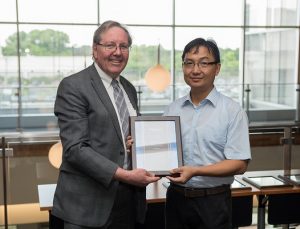Award winners share their thoughts on mentoring
Excellent mentors contribute not only to the development of those they mentor, but also to the success of the entire laboratory. This is why Argonne is committed to fostering a mentoring culture and recognizing employees who have made an exceptional impact as mentors.
Eight employees were honored this year by the Argonne Leadership Institute for their outstanding work as mentors or supervisors. Their dedication to assisting coworkers and postdocs is a great example for those considering the role of mentor.
How do these outstanding mentors and supervisors view their roles? We asked each of this year’s honorees for some insight into their approach to good mentoring.

Peter Littlewood and Sang Soo Lee, honorable mention recipient, Outstanding Postdoctoral Mentor Award
Sang Soo Lee received an honorable mention for the 2016 Outstanding Postdoctoral Mentor Award. He is a geochemist in the Chemical Sciences and Engineering Division, where he works with the Interfacial Processes Group to explore in a cross-disciplinary manner the chemistry and structure of reactive solid interfaces in contact with fluids.
His nominator said, “Sang Soo Lee is an indispensable asset for the postdocs in the interfacial processes group in CSE, significantly contributing to their professional growth and helping them successfully navigate the environment here at Argonne. He cheerfully helps them with research, provides substantial career feedback, assists with administrative tasks, and much more.”
Why is mentoring particularly important in the STEM fields?
A main role of mentoring is to convey pieces of experience from a person who has gone through a similar situation to another person who hasn’t yet but will in the future, so that this person doesn’t have to spend time and effort to learn them. It is a very efficient way, so therefore very important in almost all fields.
Did you have a mentor who made a positive impact on your career?
Many people, including my supervisors in college, colleagues, friends, and family members, have provided valuable information. All of them together are/have been my mentors.
What is the benefit of having a mentor?
It is like reading a summary before reading a whole book. It makes things that will happen in the future easier to handle.
What are the most common issues mentees want to discuss with you?
What is life at Argonne like for a junior-level career scientist? What is required to be seen as a successful scientist or how to conduct independent research? Or, what would be a good path after his/her career at a national lab?
How does mentoring benefit the Argonne community as a whole?
I think it makes junior-level scientists (mostly postdocs) more realistic and more prepared.


